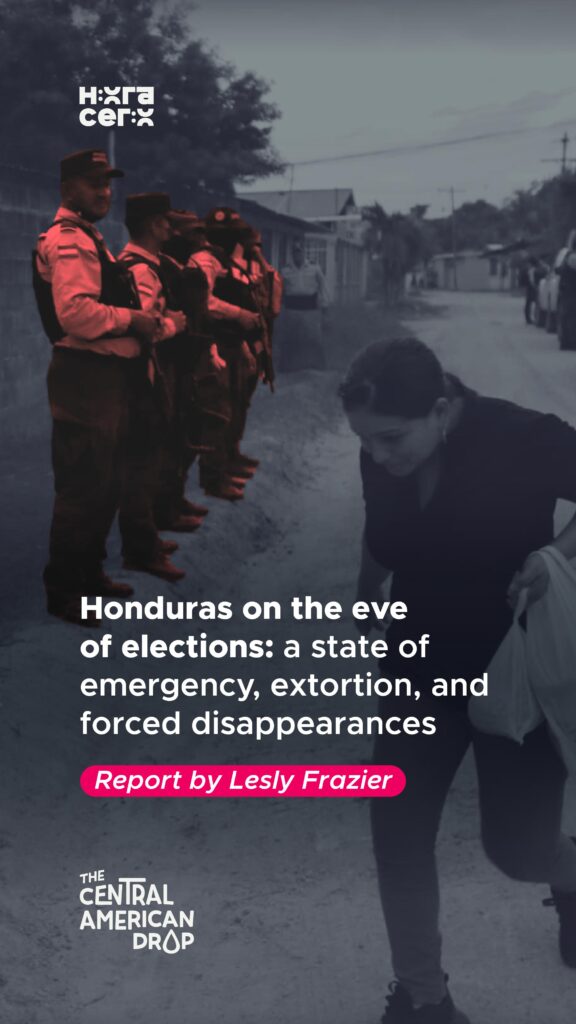
Just months before the general elections scheduled for November 30, concerns are growing about the impact the imposed State of Emergency could have on the transparency of the electoral process. Meanwhile, the government of President Xiomara Castro defends the measure as an effective tool in the fight against organized crime.
Since the State of Emergency came into effect in Honduras in December 2022, more than 1,000 complaints of human rights violations have been filed. However, civil society organizations acknowledge that the number could be higher, as there are cases and situations that families have refused to report, especially in the northern part of the country. National and international organizations continue to warn of the risks of prolonging this measure and are demanding that the government eliminate it immediately.
One of the most criticized points is the extension of the State of Emergency without the approval of the National Congress, as established in the original decree. According to Karen Valladares, director of the National Migration Institute, the measure has been extended 23 times, raising serious doubts about its legality and effectiveness. Although it was presented as an urgent response to violence and extortion, its extension has led to more restrictions on rights than concrete results in terms of security.
Valladares believes that, despite the measures, violence persists, and public trust in institutions continues to deteriorate. “Honduras has lost more rights than it has gained in security. The lack of transparency and the political use of the State of Exception could compromise the legitimacy of the electoral process,” she warned.
Along the same lines, attorney Luis Maldonado Galeas believes that, while security forces have a constitutional responsibility to ensure order, there is also a risk that the State of Exception will be used to restrict voter mobility, under irrelevant justifications. “The National Police and the Armed Forces must focus on their constitutional mission of protecting the free exercise of suffrage,” he emphasized.
Various sectors have expressed concern about the restrictions on essential freedoms such as freedom of movement, the right to assembly, and citizen participation, especially during the electoral cycle. Karen Valladares reminded Hora Cero that these restrictions directly impact the right to vote and freedom of association, which are fundamental pillars of democracy.
Since December 2022, when the State of Emergency began to be implemented, the National Commissioner for Human Rights (CONADEH) has received more than 1,000 complaints, including warrantless searches and excessive use of force. Luis Martínez, CONADEH’s legal advisor, explained that they have documented at least six formal complaints related to the suspension of rights, including violations of personal liberty, cruel treatment, torture, and arbitrary detentions.
Currently, almost 70% of the country is under a State of Emergency, with 226 of the 298 municipalities affected. This situation has ceased to be an extraordinary measure and has become a routine condition, raising serious questions in a country with weakened institutions. The normalization of the State of Emergency further aggravates the insecurity situation and threatens the conduct of a free and fair electoral process.
For its part, the Constitutional Chamber of the Supreme Court of Justice has not yet resolved the appeals filed against the State of Emergency. The Chamber’s coordinating judge, Fernando Padilla, explained that the process takes time and that they are currently trying to reduce the judicial backlog with cases pending since 2023. However, he assured that they will also address appeals related to political issues.
Fernando Padilla acknowledges that there is an outstanding debt regarding the resolution of legal appeals related to the State of Emergency. However, he maintained that it is up to the security forces to define strategies to combat violence in the country.
Given this situation, Gustavo Solórzano, president of the Honduran Bar Association, emphasizes the need for the Constitutional Chamber to act quickly. «Access to prompt and effective justice must be guaranteed. It is essential that rulings on amparos and unconstitutional appeals comply with the law and not with political interests,» he concluded.
Since the coup d’état in 2009, extortion has become one of the main threats to transporters and merchants in Honduras. Over the years, this crime has evolved and taken root in much of the country, directly affecting the economy and security of the transport sector.
With the implementation of the State of Emergency starting in December 2022, inspired by the model of President Nayib Bukele in El Salvador, a significant reduction in these crimes was expected. Initially, a visible decrease in extortion charges was recorded in municipalities such as Tegucigalpa and San Pedro Sula, thanks to an increase in operations and arrests.
Some transport associations reported that gangs temporarily retreated due to pressure from security forces. However, this improvement was temporary. As operations were reduced, extortion intensified again.
Currently, transportation workers report that they are still being forced to pay «war taxes» to up to three different criminal organizations, which have changed their methods, becoming more discreet or resorting to intermediaries to collect payment.
The perception of security among drivers and vehicle owners is low. They claim that there is no constant police presence on the roads, there is no effective anonymous reporting system, and even though perpetrators are captured, criminal organizations continue to operate with impunity. In some cases, they even report that the amount demanded for extortion is higher than before, due to fear of retaliation.
Recently, transport industry leader Wilmer Cálix publicly expressed his discontent with the ineffectiveness of the State of Emergency, pointing out that violence against the union has not decreased and that the authorities have not provided an effective response.
“So far this year, 28 transportation workers have been murdered nationwide, and it is estimated that the sector has paid around 250 million lempiras in extortion,” Cálix stated during an interview with the capital’s media. According to Cálix, the attacks continue to affect the safety and livelihood of thousands of transport workers in the country, generating a feeling of abandonment by the State.
More than two and a half years after the implementation of the State of Exception in Honduras, the results remain limited, according to multiple voices from civil society. What was conceived as a temporary and extraordinary measure has become a permanent security policy, restricting constitutional guarantees and channeling considerable resources to the security sector, without offering sustainable solutions. Furthermore, it is becoming a threat to the upcoming electoral process in the Central American country.
The legality of its continuation also remains strongly questioned, as the legally established procedure for its extension has not been followed, raising concerns about the weakening of the rule of law.

| Cookie | Duración | Descripción |
|---|---|---|
| cookielawinfo-checkbox-analytics | 11 months | This cookie is set by GDPR Cookie Consent plugin. The cookie is used to store the user consent for the cookies in the category "Analytics". |
| cookielawinfo-checkbox-functional | 11 months | The cookie is set by GDPR cookie consent to record the user consent for the cookies in the category "Functional". |
| cookielawinfo-checkbox-necessary | 11 months | This cookie is set by GDPR Cookie Consent plugin. The cookies is used to store the user consent for the cookies in the category "Necessary". |
| cookielawinfo-checkbox-others | 11 months | This cookie is set by GDPR Cookie Consent plugin. The cookie is used to store the user consent for the cookies in the category "Other. |
| cookielawinfo-checkbox-performance | 11 months | This cookie is set by GDPR Cookie Consent plugin. The cookie is used to store the user consent for the cookies in the category "Performance". |
| viewed_cookie_policy | 11 months | The cookie is set by the GDPR Cookie Consent plugin and is used to store whether or not user has consented to the use of cookies. It does not store any personal data. |